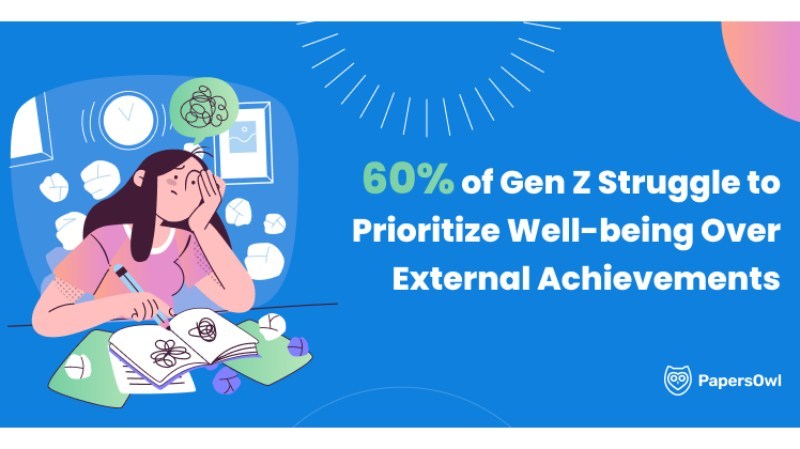
Performance anxiety isn’t just a buzzword for Gen Z — it’s a lived experience. Bombarded with societal expectations, amplified by social media, this generation grapples with challenges that are both unique and overwhelming. PapersOwl surveyed 2,000 Gen Z individuals to unravel the layers of this anxiety, uncovering some startling insights along the way.
Chasing Validation, Losing Peace
For 62% of Gen Z, the pursuit of external achievements overshadows mental well-being. Social media acts as a magnifying glass, scrutinizing every misstep and elevating the pressure to excel. A staggering 76% believe anxiety would plummet if external validation weren’t such a dominating force in their lives.
One respondent captured the sentiment perfectly:
“Everything is posted online. If you fail, the world sees it.”
This unrelenting need to impress — to be flawless — has fostered a culture where failure feels catastrophic, and success, an endless treadmill.
The Norm is Nervousness
An overwhelming 87% of Gen Z say performance anxiety is as common as morning coffee. It’s not just mental — 66% experience physical symptoms, from sweaty palms to racing hearts, every time they face high-stakes situations. And these moments aren’t rare — 77% admit to pre-event jitters, whether it’s a presentation, a test, or even a social gathering.
The kicker? The anxiety doesn’t take holidays. 52% feel heightened stress in winter, navigating seasonal obligations, exams, or work deadlines. Mondays don’t help either, as they top the charts for the most stressful day, while Thursdays offer a rare reprieve.
Procrastination: Lazy or Overwhelmed?
Why does Gen Z leave tasks until the last moment? The answer lies in the numbers:
- 42% lack motivation
- 42% feel crushed by overwhelming workloads
- 41% fear failure
Procrastination isn’t just avoidance; it’s often a byproduct of deeper issues. And while 44% admit to cramming before deadlines, 42% stress over the quality of their rushed work. The cycle is vicious, fueled by pressure and self-doubt.
Coping or Just Surviving?
Despite their struggles, Gen Z isn’t giving up. Physical activity is a favorite coping mechanism, with 62% using exercise to combat anxiety. Mindfulness comes next, practiced by 42%, and often paired with workouts — a holistic approach embraced by 70% of those practicing mindfulness.
However, the cracks remain visible. 54% doubt the effectiveness of coping mechanisms altogether, and 21% don’t engage in any anxiety relief strategies. The gap between need and action reflects the urgency of providing better mental health resources.
Rewriting the Narrative
External pressures and societal expectations are squeezing Gen Z in ways that previous generations might not fully grasp. The data tells us this: 76% want less emphasis on external validation, and 62% admit that their mental health takes a backseat to achievement.
The question isn’t whether performance anxiety exists — it does, overwhelmingly. The real challenge lies in changing the culture that fuels it. Gen Z is ready to redefine what success looks like. The rest of us just need to listen.
What if success wasn’t about validation, but fulfillment?
By shifting the focus from external measures to internal growth, we can help Gen Z break free from the chains of anxiety. The journey won’t be easy, but it’s one worth taking — for them, and for all of us.